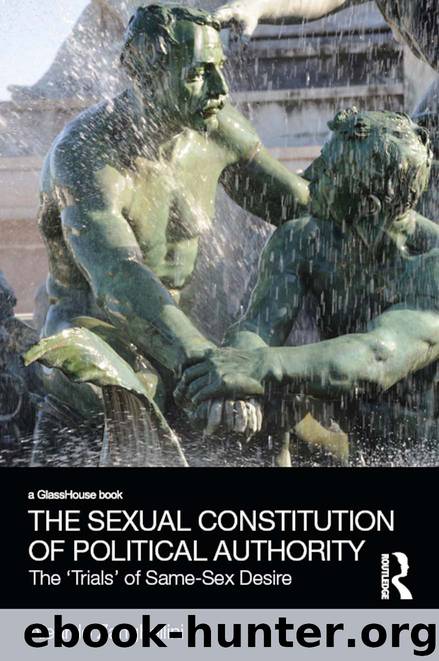The Sexual Constitution of Political Authority by Zanghellini Aleardo

Author:Zanghellini, Aleardo
Language: eng
Format: epub
ISBN: 978-1-134-06706-0
Publisher: Taylor and Francis
The king’s public spouse
Wilson’s approach differs from that of the writers discussed so far. Instead of stating or implying that same-sex desire is a cause of poor government, Wilson contributes to a discourse – in which James himself participated – aimed at a rhetorical heterosexualisation of the relationship between the ruler and the ruled, conceived as a political marriage. Within the parameters of this discourse, James’s male favourites figure as disruptors of marital harmony.
Writing in the mid-seventeenth century, Wilson is critical of James’s reign, but he avoids drawing a necessary connection between same-sex desire and poor government. To begin with, Wilson’s discussions of same-sex love read as non-judgemental. Thus, when talking about James’s favourite Robert Carr and his female paramour, Wilson (1653: 59) treats same-sex and heterosexual love as functionally and morally equivalent (‘thus did the Viscount get the Conquest of two, the king, and this Lady’). Wilson (1653: 59) even implies that Carr’s primary duties as a lover should have been to James (‘every hour the Viscount could steal from his Royal Master, he dedicated it to this disloyall Mistris’). He also makes it clear that same-sex love in itself is no bar to virtue, but that a heterosexual relationship with the wrong woman is (‘if [Carr] had not met with such a Woman, he might have been a good man’) (Wilson, 1653: 83). Wilson’s text, then, treats same-sex desire as morally unremarkable in itself, conveying as much by exploiting the definitional ambiguity (Hammond, 2002) characterising much early modern discourse on same-sex bonds. This allows Wilson to couch his statements on same-sex desire in a way that makes them just about capable of being interpreted as observations on male philia (an ostensibly asexual form of close same-sex friendship) rather than same-sex erotic attachments. At the same time, for those willing to see, the erotic quality of James’s same-sex bonds is never far below the surface of Wilson’s text. Thus, occasionally Wilson (1653: 79) sounds like a veritable connoisseur of male-to-male love (‘about this time the king cast his eye upon a Gentleman so rarely moulded, that he meant to make him a Masterpeece’).
Wilson’s non-judgemental attitude to same-sex desire does not mean, however, that he thought desire irrelevant to government. Indeed, in Wilson’s (1653: 59) view, sexual passion posed distinct problems for political rule, for lust tends to be ‘the Consumption of all Reason’. Even assuming that he shared the common early modern view that sodomy signalled a lack of moderation, Wilson did not claim that same-sex desire had a special ability to induce a loss of self-control. But Wilson (1653) – preoccupied with situations where ‘the sensitive faculties get predominance over the Reason’ (146) – did think that James’s same-sex desire had got out of hand, causing the king’s undoing:
[T]here was a reciprocall Harmony between the king and the people because they courted one another; but when the king’s Bounty contracted itself into private Favourites … bestowing the affection he promised the whole people, upon one man; … their passions flew higher than their hopes.
Download
This site does not store any files on its server. We only index and link to content provided by other sites. Please contact the content providers to delete copyright contents if any and email us, we'll remove relevant links or contents immediately.
| Biographies & Memoirs | Comics & Graphic Novels |
| LGBT Studies | Literature & Fiction |
| Mystery & Thrillers | Romance |
| Science Fiction & Fantasy | Travel |
Angels in America by Tony Kushner(2648)
A Burst of Light by Audre Lorde(2597)
Accepted by Pat Patterson(2363)
Unbound by Arlene Stein(2267)
And the Band Played On by Randy Shilts(2189)
The Velvet Rage by Alan Downs(1867)
Binding Devotion by Kiki Archer(1843)
The Gender Creative Child by Diane Ehrensaft & Norman Spack(1783)
Sister Outsider by Audre Lorde(1753)
Merv by Merv Griffin(1610)
Irreversible Damage: The Transgender Craze Seducing Our Daughters by Abigail Shrier(1561)
The Whole Lesbian Sex Book by Felice Newman(1459)
Living_by_the_Code_v1.1.1 by 2019(1389)
Queer City by Peter Ackroyd(1386)
Hindoo Holiday by J. R. Ackerley(1372)
Men on the Make: True Gay Sex Confessions by Shane Allison(1313)
How to Understand Your Gender by Alex Iantaffi(1311)
The Girls: Sappho Goes to Hollywood by Diana McLellan(1307)
Better With You by Ellen Joy(1179)
